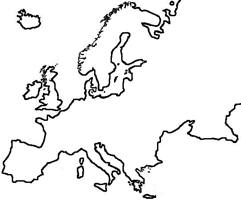
|
The Society of Folk Dance Historians (SFDH) Europe
[
Home |
About |
Encyclopedia | CLICK IMAGE TO ENLARGE |

|
BACKGROUND
Information: A region.
Europe is a continent located entirely in the Northern Hemisphere and mostly in the Eastern Hemisphere. It is bordered by the Arctic Ocean to the north, the Atlantic Ocean to the west, and the Mediterranean Sea to the south. The prevalent definition of Europe as a geographical term has been in use since the mid-19th century. Europe is taken to be bounded by large bodies of water to the north, west and south; Europe's limits to the far east are usually taken to be the Urals, the Ural River, and the Caspian Sea; to the southeast, including the Caucasus Mountains, the Black Sea and the waterways connecting the Black Sea to the Mediterranean Sea.
Islands are generally grouped with the nearest continental landmass, hence Iceland is generally considered to be part of Europe, while the nearby island of Greenland is usually assigned to North America. Nevertheless, there are some exceptions based on sociopolitical and cultural differences. Cyprus is closest to Anatolia (or Asia Minor), but is usually considered part of Europe both culturally and politically and is a member state of the European Union.
Two world wars and an economic depression dominated the first half of the 20th century.
Languages: Europe has about 225 indigenous languages, mostly falling within three Indo-European language groups: the Romance languages, derived from the Latin of the Italy; the Germanic languages, whose ancestor language came from southern Scandinavia; and the Slavic languages.
Religions: The largest religion in Europe is Christianity, including Catholic, Eastern Orthodox and various Protestant denominations. Among Protestants, the most popular are historically state-supported European denominations such as Lutheranism, Anglicanism, and the Reformed faith.
COUNTRIES
- Albania – a country.
- Austria – a country.
- Belarus – a country.
- Belgium – a country.
- Bulgaria – a country.
- Czechia – a country.
- Denmark – a country.
- England – a country.
- Estonia – a country.
- Finland – a country.
- France, a country.
- Germany, a country.
- Greece, a country.
- Hungary – a country.
- Iceland – a country.
- Ireland – a country.
- Italy – a country.
- Latvia – a country.
- Liechtenstein – a country.
- Lithuania – a country.
- Luxembourg – a country.
- Macedonia – a country.
- Moldova – a country.
- Netherlands (Holland) – a country.
- Northern Ireland – a country.
- Norway – a country.
- Poland – a country.
- Portugal – a country.
- Romania – a country.
- Russia – a country.
- Scotland – a country.
- Serbia – a country.
- Slovakia – a country.
- Slovenia – a country.
- Spain – a country.
- Sweden – a country.
- Switzerland – a country.
- Ukraine – a country.
- Wales – a country.
REGIONS AND CULTURES
- Balkans – a region.
- Basque Country – an ethnic region.
- Beware of Your Behavior in Foreign Lands, a list.
- Britain – a region.
- British Isles – a region.
- Epirus – a region.
- Great Britain – a region.
- Greenland, a country in North America that is politically and culturally associated with Europe.
- Persia, a region.
- Renaissance – a culture.
- Scandinavia – a region.
This page © 2018 by Ron Houston.
Please do not copy any part of this page without including this copyright notice.
Please do not copy small portions out of context.
Please do not copy large portions without permission from Ron Houston.